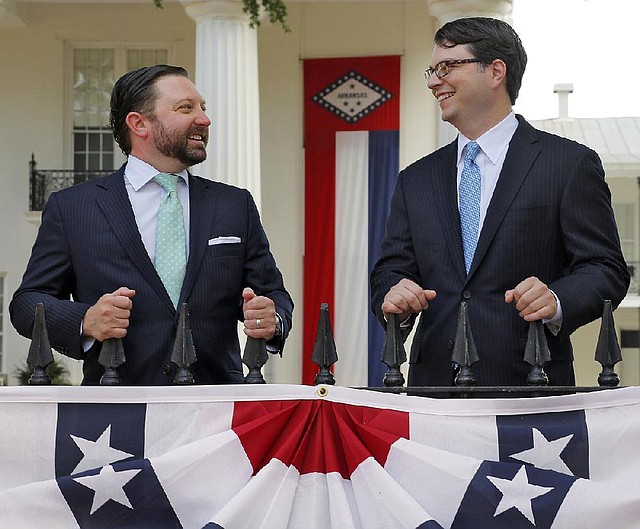Hearts & Hooves kicks off polo event
Stuart Irby (left) and Bo Brister organized the first annual Little Rock Polo Classic to benefit Hearts & Hooves, a therapeutic riding center in Sherwood.
Sunday, August 31, 2014
Sometimes -- not always, not even often -- an event goes out in search of a charity.
Bo Brister's friend Stuart Irby introduced him to horseback riding in 2012. The Stephens Inc. co-workers come from the same hometown of Jackson, Miss., and Irby's uncle, Joe Irby, founded the Jackson Polo Club.
Now all three men live in Little Rock, and Stuart Irby has begun a polo club of his own. He and Brister wanted the fledgling Windrush Polo Farm to host a tournament. All they needed was a reason.
"We like doing work with a purpose," Brister says.
Enter Hearts & Hooves, the therapeutic riding center in Sherwood.
In 2000, Kerrie Walker, Pat White's epileptic daughter, rode horses the family boarded at a Sherwood barn. Riding helped Walker stay fit, since weight gain was a side effect of her medicine. One day, when White was watching Walker ride, another woman who also boarded horses said she wished her autistic child was able to ride.
Spawned by an offhand comment, White founded the center in 2001 with help from Lee Kenniham and her late husband, Walter Kenniham, who owned the land. Rather than renew the lease to the boarding facility, the Kennihams gave it to Hearts & Hooves for a dollar per year for 30 years.
Last year while stuck at the airport, Brister saw a news spot about Hearts & Hooves. It was kismet. He called and asked if they would be interested in helping him plan a benefit polo match, the first Little Rock Polo Classic.
"We set the goal two years ago, that 2014 would be our first year to have a charity event ... we obviously are horse enthusiasts, and Hearts & Hooves is a quality organization," Brister says.
"Yeah, they're a small charity. ... There are plenty of big charities out there that have lots of resources and funding mechanisms, and we were trying to find something" -- Irby pauses -- "It fits. Horses. It fits well," he says.
Hearts & Hooves serves troubled youth and soldiers with post-traumatic stress disorder, as well as riders of all ages who have physical or mental disabilities. According to Liz Marge, the center's director, it depends on fundraising for 30 percent of its income. Of about 95 riders each week, some are on complete scholarship; others pay about a fourth of what it costs per rider to maintain the barn and a dozen horses. There are six paid staff and about 50 volunteers.
"People with disabilities are in a world where everyone is telling them what they can't do or what they need help with. So learning to do something independently, especially if it's controlling a 1,000-pound animal, can really give you confidence," Marge says.
Hearts & Hooves has an arena, several pastures and a trail where riders work on sensory issues and coordination, steering a horse through the "carwash," made of hanging pool noodles, and tossing beanbags through targets or catching a ball on horseback.
Marge plans to spend some tournament funds on a smaller horse, because many clients have tight leg muscles from conditions such as Cerebral Palsy. (When the center received a grant from United Parcel Service, she bought Peanut, a member of a sturdy breed that can hold a 200-pound adult but is short enough for an instructor to walk alongside for balance help.)
Any horse the center acquires must be previously trained, although once it gets to Hearts & Hooves, it has to undergo desensitization. This is to prevent balking when a rider squeals or a therapist tosses a ball.
"This [tournament] is kind of our idea from conception to follow through. Our goals are temperate the first couple years," Brister says. "By year three or four, we could have a pretty sizable event."
The fundraising goal for the Little Rock Polo Classic on Sept. 13 is $20,000. They've sold more than 150 VIP tickets at $75. General admission is $25. The night before the event, sponsors ($500 and up) can attend Polo on the Rocks, a meet-and-greet cocktail party with the players. The match is family-friendly with food trucks, tailgating (at $200 a vehicle), prizes for the best dressed woman and man, an after-party with music and a half-time divot stomp.
Polo teams are small, three players to a field the size of Irby's. (A regulation field, roughly the size of nine football fields, accommodates four-person teams.) Irby and his uncle, who often travel to tournaments, will represent Little Rock in the event, playing against Memphis-based horsemen. The tournament's ringer is Martin Estrada of Palm Beach, Fla., who played on the U.S. Open Polo Championship's winning team in 1997.
"Polo's definitely not widespread anywhere. There's maybe 2,000 members of USPA [the U.S. Polo Association]. It's not Pretty Woman," Irby says.
"It's like soccer, conceptually," Brister says. "You have to move the ball down a field and roll it through a goal. Defense is a big part of it. ... It's a horse and a person really working together."
This applies to therapeutic riding as well, according to Marge. Riders learn nonverbal communication skills, which include understanding their body language and how it affects a sensitive creature. Learning with a horse, despite its size, can be psychologically safer than learning with another person.
"The most important part is not being afraid," Irby says. "Animals can sense fear. ... It's just a matter of telling them what you want them to do, in a way they can understand."
The Little Rock Polo Classic will be at Windrush Polo Farm, 21002 Burlingame Road, from 2 to 6 p.m. Sept. 13 with music to follow. For more information or to buy tickets, go to www.littlerockpoloclassic.com or call (501) 812-9430.
High Profile on 08/31/2014
